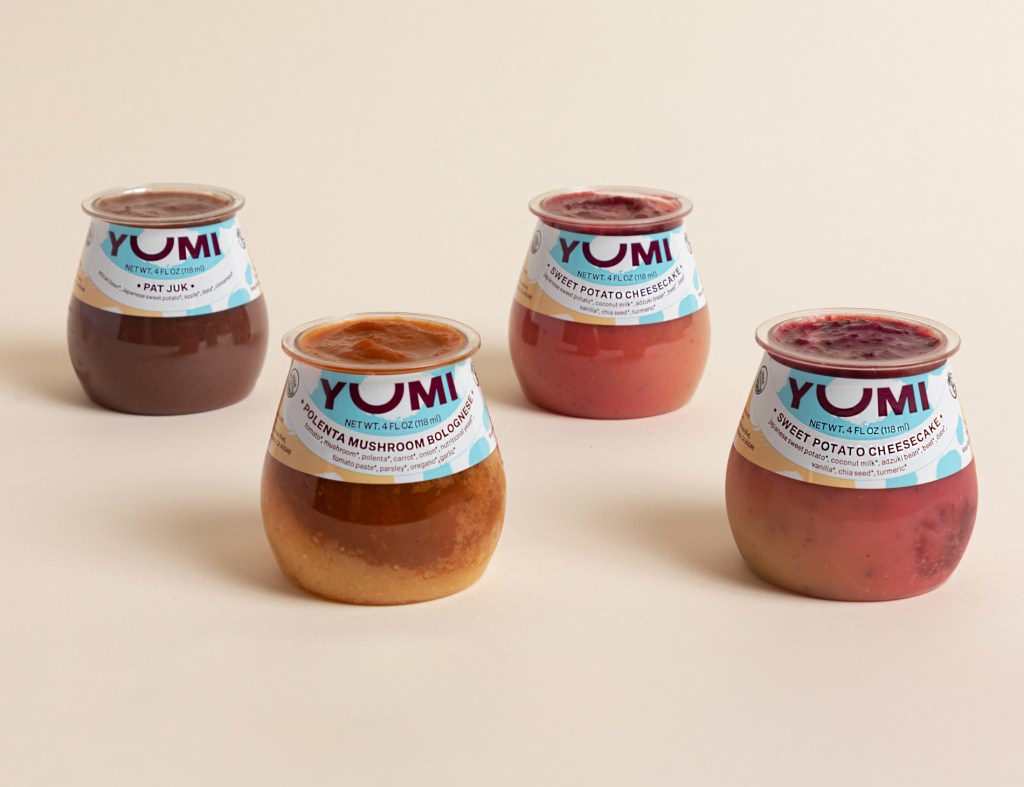Your cart is currently empty!
What is the Difference Between Different Kinds of Baby Foods?

Some are soft and soupy, some are mashed and chunky — there’s a variety of baby food, so we’ve made a guide on all the different kinds of baby foods!
What is the Difference Between Different Kinds of Baby Foods?
At around 6 months, you can begin introducing solid foods into your baby’s diet. And boy does this stage get interesting! Your baby will play with their food, stick their hands in it, and maybe even throw it on the wall (or you if you’re less fortunate). But don’t be discouraged! These are good signs that your baby is interacting with the world around them by discovering smell, textures, colors, and experiencing their senses!
Your baby’s food needs will also change during this time! While, at 6 months, your baby may only be able to eat soupy solids, at 11 months, they begin to chew and eat bigger pieces of food.
This is why there are different kinds of baby foods, or as we like to call them, different stages! Each stage is an important milestone for your baby and comes with the appropriate nutrition they need. We’ve broken down the stages, so let’s check them out!

The 8 Stages
Stage 1
Stage 1 foods are for your little one of 6 months and up, or when you first begin to introduce solid foods into your baby’s diet. At this age, your baby reaches a lot of new milestones. Their independence emerges, as does their curiosity and need to explore their five senses. During this stage, you’ll generally begin introducing thin foods with a soupy consistency into your baby’s diet.
Helpful tip: stage 1 foods are thin, watery, and can get pretty messy. While we embrace the messes that life brings, it also may not be a bad idea stock up on bibs!
Stage 2
At this age, you can also begin introducing stage 2 foods, which are thicker, but still single ingredient purees. These foods have more texture and are pureed for your baby’s enjoyment.
Since your baby is beginning solid foods and using less breastmilk, stage 1 and stage 2 foods are packed full of iron! Iron is essential to your baby’s development and oxygen levels, so it’s vital that they consume a diet rich in iron!
Stage 3
Stage 3 foods can be introduced at 7 months. These purees are blends of two ingredients. The combination of foods helps your baby’s taste develop and provides a blend of nutrients. Stage 3 foods are thicker than stage 1 foods, but not quite chunky foods yet.
At this stage, your baby may be crawling, rolling back and forth on their hands and knees, and beginning to interact with how their bodies move. For this reason, your baby’s nutrition needs include protein and minerals essential to their movement, and all of which are provided in our stage 3 foods.
Stage 4
Stage 4 foods are for your little ones of 8 months and older. These are mashed purees with multiple ingredients that provide your baby with the nutrition they need. These can have textures such as seeds, fibers, and grains to help develop your baby’s texture and taste palate and explore different foods.
Stage 4 foods are also rich in magnesium, which support your baby’s sleep. We all know the power of a good nap, so providing magnesium is essential in promoting sleep!
Stage 5
From 9 months and older, you can introduce stage 5 mashed baby foods. These have multiple ingredients and incorporate seeds, fibers, skins, and grains similar to stage 4 foods. This helps develop your baby’s texture palette.
At this stage, copper, magnesium, and manganese are important minerals for your baby’s metabolism and blood cell formation. Chia seeds, grains, and other textured ingredients in stage 5 foods provide these essential nutrients!
Stage 6
At 10 months, your little one can start eating stage 6 foods. These are thick and chunkier foods made for your baby to pinch and grab with their hands! These blends are packed with all the nutrients they need for keeping their bodies strong.
Stage 7
At 11 months and older, your baby begins chewing and taking an independent approach to eating. They explore texture and taste, and this leads to stage 7. At stage 7 we have nutrient-dense snack bites for your baby to enjoy.
Stage 8
Stage 8 is the snacking stage and is meant for your baby who’s 11 months or older! Growing babies need three meals and 2 snacks per day! So, we’ve made two delicious snack options for your baby at the last stage of eating!

Why Stages?
Moving your baby through food stages has a few benefits.
Firstly, it helps slowly introduce new foods. This is gentle on your little one’s tummy and metabolism.
It also helps your baby get used to new textures and tastes. Babies can be picky. As they explore solid foods with their senses, they may not take to a color, smell, taste, or texture right away! The food stages start with thinner foods that resemble breast milk in texture, and move to mashed, chunkier foods, all the way to bite-sized nutrient-rich snacks and puffs, to slowly integrate textures and tastes.
According to the American Academy of Pediatrics, it’s important to offer a variety of textures.
What you feed your baby now sets the stage for their future health and eating habits. In other words, feeding them a variety now can help your baby not be so picky later on!

How To Know When Your Baby is Ready for the Next Stage
Every little one moves at their own pace, so you can’t always count on age to determine what stage your babe is at. Here are some signs that might mean your baby is ready for the next stage!
They ask for more.
If your baby is eating stage 2 foods like it’s no big deal, and then looking hungry or asking for more, they might be ready to move on to the next stage! Grab some stage 3 combination foods and try introducing these to your baby.
They don’t have a tongue reflex.
When you first begin feeding your baby solids, they will likely have a tongue reflex. This reflex pushes solid foods out of their mouth during feedings. You will know when your baby is ready to move onto the next stage when they no longer have this reflex!
They enjoy their food!
Probably the most heartwarming sign to look for in your baby’s journey through the food stages is their enjoyment. If they are polishing off foods, giggling, and smiling happily, they may be ready for the next stage. On the flip side—if they are showing signs of distaste or unhappiness, it’s okay to go back to a food they enjoy and try introducing the new food slowly!

Things to Remember
While you go through each stage of baby food with your little one, remember that pace and preference is different for everyone. If your baby doesn’t take to a certain food right away, or seems to prefer one food over another, that’s okay! Their tastes are developing.
If your baby doesn’t seem to take to a new stage, try slowly integrating and introducing it instead of switching cold turkey.
For example, let’s say your baby is in stage 6 and loves pinching foods and eating Peas and Carrots or our Root Medley. When it comes time to introduce some stage 7 foods like our Banana Bread Bites, your baby doesn’t seem interested.
If this happens, try placing a banana bite or other snack bite in front of your baby before mealtime or if they give you hunger cues. They may push the bites away a few times and reject them, and that’s alright! You can continue with another stage while integrating a new one. Your baby should eventually want to try a snack bite.
The same principle also applies to flavors. Every baby has a taste preference, and if your baby doesn’t seem to take to a certain flavor, it’s okay! There are plenty of other flavor options that provide essential nutrients for your little one.
(Check out our other blog post for more tips on introducing solid foods into your baby’s diet!)

Summary
As your baby’s nutrition needs and eating abilities develop and change, so do Yumi’s carefully crafted baby foods!
Our stages are designed to grow with your baby and provide the necessary nutrients in every stage of their growth, so they get the nutrients they need to thrive and get the most out of every bite.
As your baby reaches different milestones in their growth and development, they need food to meet them there, and we strive to get your baby the nutrients they need at their current stage of life!









